MercoPress. South Atlantic News Agency
Tag: Germany
-
Monday, October 31st 2011 - 20:12 UTC
For Euro aid package to work “all elements must be implemented” says Germany

The package of measures agreed by European leaders this month to stem their debt crisis will only work “if all elements are implemented”, German Deputy Finance Minister Joerg Asmussen said in an interview Monday.
-
Friday, October 28th 2011 - 16:36 UTC
German highest court could delay implementation of Euro bail out accord

The German highest court suspended Friday a parliamentary committee's right to approve urgent actions by the Euro zone's bailout fund, potentially delaying decision-making in Europe's top economy on key moves to tackle the bloc's crisis
-
Wednesday, October 26th 2011 - 15:22 UTC
Strong support for Merkel ahead of the Euro bail out summit

Germany's Bundestag lower house of parliament approved on Wednesday a motion to strengthen the Euro zone rescue fund via leveraging, providing Chancellor Angela Merkel with the mandate she needs to negotiate at a key Euro summit in Brussels.
-
Tuesday, October 25th 2011 - 04:26 UTC
German parliament joins discussion on Euro rescue plan
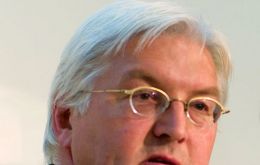
Germany's political opposition has succeeded in ensuring plans to enhance Europe's bailout fund be brought to a vote in parliament on Wednesday. The decision came after the Bundestag's plenary session rejected the opposition's demands for an open debate just Friday.
-
Saturday, October 22nd 2011 - 11:14 UTC
Germany sets aside 130bn dollars for renewable energy to replace 28% nuke power

German Chancellor Angela Merkel announced on 30 May that Germany, the world's fourth-largest economy and Europe's biggest, would shutter all of its 17 nuclear power plants between 2015 and 2022, an extraordinary commitment, given that they currently produce about 28% of the country's electricity.
-
Wednesday, October 19th 2011 - 23:07 UTC
Greeks have transferred to Swiss banks 200 billion Euros, claims German press

Greeks fearing the safety of their deposits in banks, as well as Greeks trying to evade paying taxes, have reportedly “bailed out” their money of the debt struck country into the safe haven of Swiss banks in a scale of 200 billion Euros.
-
Wednesday, October 19th 2011 - 07:27 UTC
Germany committed to an EU/Mercosur trade agreement said Merkel
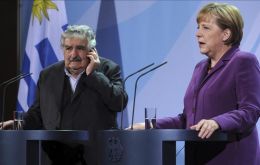
The European Union will seek to further discussions over a trade deal with Mercosur at the upcoming G20 summit in Cannes in November announced on Tuesday German Chancellor Angela Merkel alongside visiting Uruguayan president Jose Mujica.
-
Wednesday, October 19th 2011 - 06:58 UTC
The Guardian reports Germany and France agreed on 2 trillion Euros rescued fund
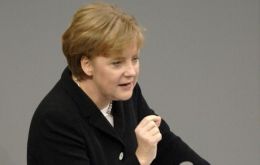
The Guardian newspaper reported on Tuesday that France and Germany had agreed to boost a euro zone financial rescue fund to two trillion Euros pushing US stocks and the Euro higher despite doubts about whether there was such an agreement.
-
Tuesday, October 18th 2011 - 09:04 UTC
Mujica tries “to sell” Uruguay in Hamburg; Tuesday with Chancellor Merkel
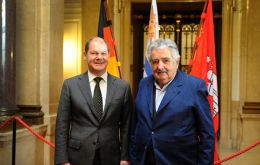
Uruguayan president Jose Mujica tried to seduce German investors and business people during his first day visit to Germany which has been marked by the impact of the European crisis. On Tuesday he is scheduled to meet Chancellor Angela Merkel and President Christian Wulff.
-
Monday, October 17th 2011 - 17:28 UTC
Germany warns Greek bondholders will have to accept steeper ‘hair-cut’
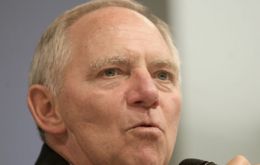
Germany lowered expectations of a breakthrough in the Euro zone's sovereign debt crisis next weekend, saying Sunday's EU summit will not produce a final solution, and kept up pressure on banks to accept bigger write-downs on Greek debt.
